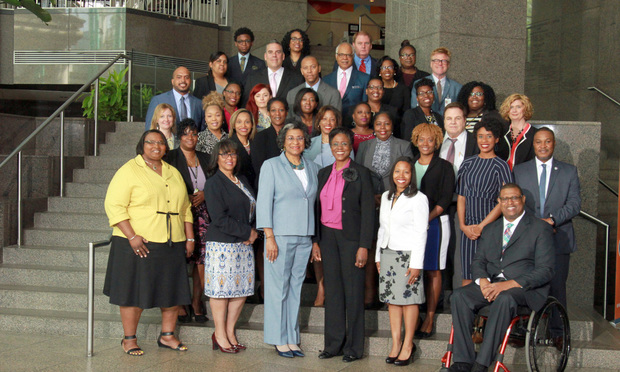In-House Legal Department of the Year: Office of the Fulton County Attorney
The dispute with the revenue commissioner "is a case of first impression in Georgia, and our ability to find this power allowed the citizens of Fulton County the opportunity to avoid an increase in their property values, until such time as the members of the Board of Commissioners were comfortable with the processes being used to assess the values of residential property."
June 19, 2019 at 02:00 PM
6 minute read
 Fulton County, Georgia, Law Department (Photo: John Disney/ALM)
Fulton County, Georgia, Law Department (Photo: John Disney/ALM)
If you've ever felt like you have too many bosses, you might feel better when you talk to lawyers at the Office of the Fulton County Attorney, which advises 43 departments in Fulton County and the seven member Board of Commissioners.
The office handles all of the civil litigation and general governance needs of the county—tasks that have included several unique and groundbreaking matters. The office was involved with negotiations to create the last municipality in Fulton County, the city of South Fulton. It also led the creation of a separate board of health for Fulton County within the State Board of Health operations.
In a case that is under appeal, the office challenged the powers of the commissioner of the Department of Revenue, using a creation powers law from the 1880s to support actions the Board of Commissioners took in correcting the 2017 tax digest.
The office also has handled thousands of tax appeals, excess refund challenges and bond issuances. It also defended the use of the state-controlled voting machines for the November 2018 elections.
County Attorney Patrise Perkins-Hooker answered our questions below.
With so many potential clients—commissioners, county executives and agency heads–how does the Fulton County law department maintain consistent positions on legal issues? Is there one client who makes the final decision on what legal goal to pursue?
The Office of the County Attorney maintains a legal opinion database which tracks and holds all of the opinions that we issue to our clients. We have a team of professionals, some of whom have been here for over 25 years that help us identify which issues have been addressed by the Office of the County Attorney and the positions taken by previous county attorneys.
Unless there are changes in the law on a given topic, the positions taken by the office generally have remained consistent. The legal issues pursued by the Office of the County Attorney are determined based upon the requests that we receive from the 48 different departments or agencies that we support. We never really know on a given day what we will have to tackle. In addition to inquiries from the departments, we support initiatives of the county manager and the Board of Commissioners when requested. Examples of these initiatives are the updating of the county's personnel policy and procedure manual last year and the change in the appeal format for the county's employee disciplinary process from the use of a personnel board to the use of hearing officers. We were also very instrumental in the revisions to the county's purchasing code.
How did the tax digest fight, which is on appeal, turn on a 19th century law?
The dispute over the 2017 tax digest centered on whether the county Board of Commissioners had the authority to revise assessment notices and send out a new batch of notices correcting the first. We wanted to use the residential values from the 2016 tax digest. The values in the 2016 tax digest had been approved by the commissioner of the Department of Revenue and, given the nature of the complaints that were submitted by citizens, this tax digest appeared to be the best option to accomplish the board's desires.
Members of our team and I analyzed the situation and the current state of the law to determine that, if the Board of Assessors under case law was prohibited from sending out a second set of assessment notices, then this power had to reside somewhere. My team researched the powers of the Board of Commissioners and tracked each and every power granted to the board to see if this entity had the power. The team went all the way back to the laws of 1880-1881 when the Fulton County Board of Commissioners' predecessor, the Board of Commissioners of Roads and Revenues, was first created.
That law had never been repealed. The creation statute gave the county the right to “correct the tax digest” without any limitations or qualifications. This case is a case of first impression in Georgia, and our ability to find this power allowed the citizens of Fulton County the opportunity to avoid an increase in their property values until such time as the members of the Board of Commissioners were comfortable with the processes being used to assess the values of residential property. The changes were completed, and the tax bills for 2018 reflected the proper adjustments.
Under what circumstances does the department seek outside counsel, and how is that counsel chosen?
Our office seeks outside counsel when we are confronted with legal challenges that I believe are outside of our skill set or ability to handle, given our workload (i.e., class action lawsuits); lawsuits where we have a conflict of interest between the county and the litigants or between the two litigants (i.e., the dispute between the chief judge of the Magistrate Court and the clerk of the Superior and Magistrate Courts); matters where we need specialized assistance due to the volume of the matters (i.e., excess refund cases).
I make the ultimate decision on whom to hire to assist the office with legal matters, subject to an annual budget approved by the Board of Commissioners. I select attorneys based upon criteria that are similar to the ones used by other legal departments: experience with governmental clients, subject matter expertise or knowledge, ability to deliver the requested services in a timely manner and the cost for the services. Our office has a set of protocols and a fee structure which limits what our office can be billed for and the maximum hourly rate for outside counsel performing regular legal services. The rate structure does vary for other legal services like consultants or finance related services associated with bond closings. We are currently utilizing the services of over 20 law firms of diverse talent.
This content has been archived. It is available through our partners, LexisNexis® and Bloomberg Law.
To view this content, please continue to their sites.
Not a Lexis Subscriber?
Subscribe Now
Not a Bloomberg Law Subscriber?
Subscribe Now
NOT FOR REPRINT
© 2025 ALM Global, LLC, All Rights Reserved. Request academic re-use from www.copyright.com. All other uses, submit a request to [email protected]. For more information visit Asset & Logo Licensing.
You Might Like
View All
Transgender Care Fight Targets More Adults as Georgia, Other States Weigh Laws

Georgia Republicans Push to Limit Lawsuits. But Would That Keep Insurance Rates From Rising?
5 minute read
A Plan Is Brewing to Limit Big-Dollar Suits in Georgia—and Lawyers Have Mixed Feelings
10 minute readTrending Stories
- 1Securities Report Says That 2024 Settlements Passed a Total of $5.2B
- 2'Intrusive' Parental Supervision Orders Are Illegal, NY Appeals Court Says
- 3Federal Laws Also Preempt State's Swipe Fee Law on Out-of-State Banks, Judge Rules
- 4Judge Grills DOJ on Trump’s Birthright Citizenship Executive Order
- 5Exceptional Growth Becoming the Rule? Demand and Rate Hikes Drove Strong Year for Big Law
Who Got The Work
J. Brugh Lower of Gibbons has entered an appearance for industrial equipment supplier Devco Corporation in a pending trademark infringement lawsuit. The suit, accusing the defendant of selling knock-off Graco products, was filed Dec. 18 in New Jersey District Court by Rivkin Radler on behalf of Graco Inc. and Graco Minnesota. The case, assigned to U.S. District Judge Zahid N. Quraishi, is 3:24-cv-11294, Graco Inc. et al v. Devco Corporation.
Who Got The Work
Rebecca Maller-Stein and Kent A. Yalowitz of Arnold & Porter Kaye Scholer have entered their appearances for Hanaco Venture Capital and its executives, Lior Prosor and David Frankel, in a pending securities lawsuit. The action, filed on Dec. 24 in New York Southern District Court by Zell, Aron & Co. on behalf of Goldeneye Advisors, accuses the defendants of negligently and fraudulently managing the plaintiff's $1 million investment. The case, assigned to U.S. District Judge Vernon S. Broderick, is 1:24-cv-09918, Goldeneye Advisors, LLC v. Hanaco Venture Capital, Ltd. et al.
Who Got The Work
Attorneys from A&O Shearman has stepped in as defense counsel for Toronto-Dominion Bank and other defendants in a pending securities class action. The suit, filed Dec. 11 in New York Southern District Court by Bleichmar Fonti & Auld, accuses the defendants of concealing the bank's 'pervasive' deficiencies in regards to its compliance with the Bank Secrecy Act and the quality of its anti-money laundering controls. The case, assigned to U.S. District Judge Arun Subramanian, is 1:24-cv-09445, Gonzalez v. The Toronto-Dominion Bank et al.
Who Got The Work
Crown Castle International, a Pennsylvania company providing shared communications infrastructure, has turned to Luke D. Wolf of Gordon Rees Scully Mansukhani to fend off a pending breach-of-contract lawsuit. The court action, filed Nov. 25 in Michigan Eastern District Court by Hooper Hathaway PC on behalf of The Town Residences LLC, accuses Crown Castle of failing to transfer approximately $30,000 in utility payments from T-Mobile in breach of a roof-top lease and assignment agreement. The case, assigned to U.S. District Judge Susan K. Declercq, is 2:24-cv-13131, The Town Residences LLC v. T-Mobile US, Inc. et al.
Who Got The Work
Wilfred P. Coronato and Daniel M. Schwartz of McCarter & English have stepped in as defense counsel to Electrolux Home Products Inc. in a pending product liability lawsuit. The court action, filed Nov. 26 in New York Eastern District Court by Poulos Lopiccolo PC and Nagel Rice LLP on behalf of David Stern, alleges that the defendant's refrigerators’ drawers and shelving repeatedly break and fall apart within months after purchase. The case, assigned to U.S. District Judge Joan M. Azrack, is 2:24-cv-08204, Stern v. Electrolux Home Products, Inc.
Featured Firms
Law Offices of Gary Martin Hays & Associates, P.C.
(470) 294-1674
Law Offices of Mark E. Salomone
(857) 444-6468
Smith & Hassler
(713) 739-1250







